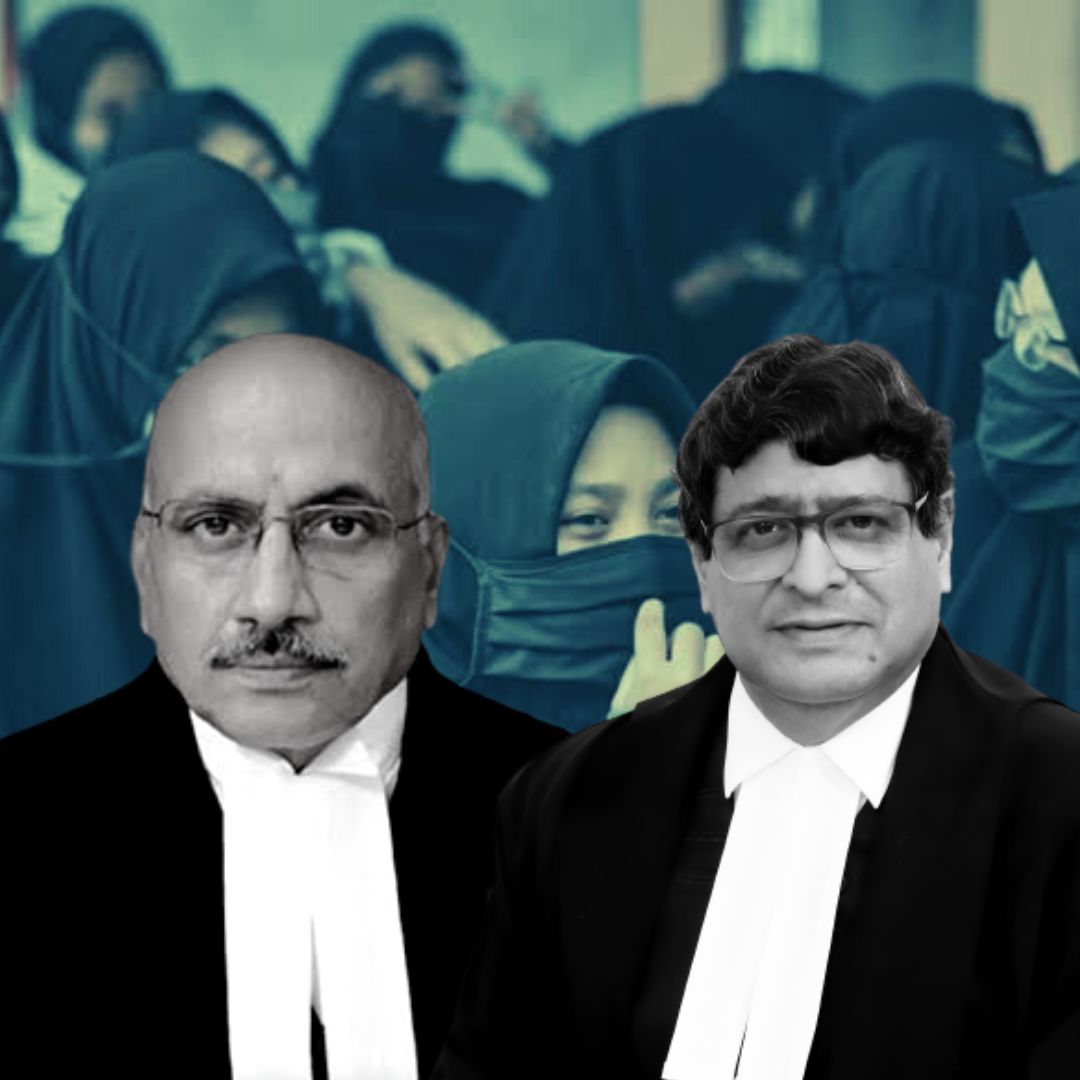Karnataka Hijab Row: Supreme Court's Two-Judge Bench Gives Split Verdict, Directs Case To CJI
Karnataka, 13 Oct 2022 8:34 AM GMT
Editor : Snehadri Sarkar |
While he is a massive sports fanatic, his interest also lies in mainstream news and nitpicking trending and less talked about everyday issues.
Creatives : Laxmi Mohan Kumar
She is an aspiring journalist in the process of learning and unlearning many things. Always up for discussions on everything from popular culture to politics.
The long-standing Karnataka Hijab row took an unexpected turn with the two-judge bench of the Supreme Court presenting a divergence in their opinions on the issue. It has now been directed to be presented at the court of the Chief Justice of India.
All ears were on the Supreme Court verdict on the long-standing Hijab row that had caused much unrest in the Karnataka state. The verdict was to decide between the rights of a community's religious practices against that of the "uniformity" practised in educational institutions. At a time when the world has been taking the hijab as a symbol of choice and resistance, the verdict coming out from one of the world's largest democracies marks a considerable impact on the discussion of rights.
However, with the Supreme Court facing a conflict of opinion, the issue continues to prolong its legal battle.
The Ruling
On September 22, after hearing extensive arguments from the petitioners and the state, the court had reserved its decision to be heard at 10:30 am on October 13. Since then, many communities, including the students and the religious ones, have eagerly awaited a fair ruling.
The decision rested in a two-judge bench headed by Justices Hemant Gupta and Sudhanshu Dhulia. Initial reports suggested that both judges gave a "split verdict". Justice Hemant Gupta dismissed the appeals challenging Karnataka High Court's verdict and upheld the state government's order to ban wearing hijabs in educational institutions. Meanwhile, Justice Sudhanshu Dhulia set aside the HC order and was of the opinion that the Hijab is a matter of choice, "nothing more, nothing less", and that the education of the Muslim girl child was of primary consideration to him.
Differing in their observations, the bench ordered the appeals to be placed before the larger bench of the Chief Justice of India. Further, the apex court will consider whether the matter should be referred to a nine-judge bench, according to an article by the India Today.
Backdrop Of The Case
At the beginning of January 2022, a dispute erupted in regard to school uniforms. Few Muslim students were denied entry to classes for wearing the hijab under the grounds that it was a violation of the college's uniform policy. The dispute gradually spread across several other educational institutions and resulted in protests across different groups.
The extensive protests seen in the state nudged the Karnataka High Court to issue an order and hear the petitions filed by multiple students seeking their right to wear hijab in the classrooms. On March 15, the Karnataka High Court dismissed the petitions filed by Muslim pre-university college students and observed that wearing the hijab is not an essential practice in Islam.
Stating that the freedom of religion prescribed under Article 25 of the Constitution is subject to reasonable restrictions, the bench ruled that wearing the hijab could be restricted in government colleges that have regulations in terms of uniforms. The decision to ban the hijab in educational institutes was criticised heavily within the country as well as by external bodies from the United States, Pakistan, Human Rights Watch, and so on.
Challenging this verdict, several petitioners moved to the Supreme Court, saying that the right to wear the hijab comes under the ambit of 'expression' and that they are entitled to it under Article 19(1)(a) of the Constitution.
Over time, with multiple hearings and several groups bringing in petitions, the state government presented their stand on the case and denied charges of targeting minority communities. The state told the SC that the Hijab row was not "spontaneous" but "part of a larger conspiracy", as none among the students were wearing a hijab before 2022 when the row had erupted.
Pointing out that "women are revolting" against the hijab in many of the constitutionally Islamic countries, the state claimed that the hijab movement was started by banned groups such as the Popular Front of India (PFI) to create religious tensions.
However, several groups, such as the All Indian Muslim Personal Law Board, continued to appeal against the same. According to an article by the Indian Express, the board contended that "as far as interpretation of scriptures in the holy Quran are concerned, there is a consensus amongst religious scholars…that practice of hijab is 'wajib' (mandatory), a set of obligations, which if not followed, he/she will commit 'sin' or become a 'sinner'."
Lawyers appearing for the petitioners also insisted that preventing the girls from wearing the hijab would jeopardise their education as they might stop attending classes. Many await a final verdict in the face of the several reported cases of violence against hijab-wearers and the question upon the freedom to practice one's religion.
Also Read: Discrimination And Conflict: How Karnataka's Hijab Row Impacts Young Students?
 All section
All section















